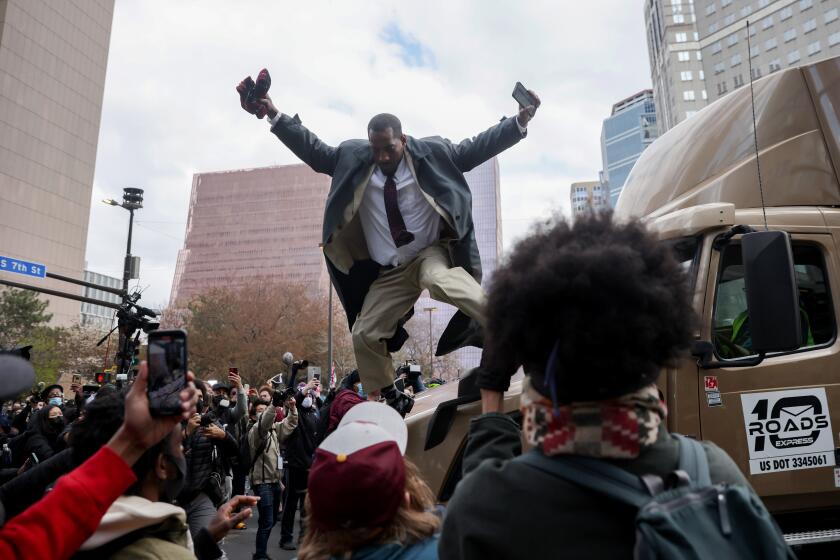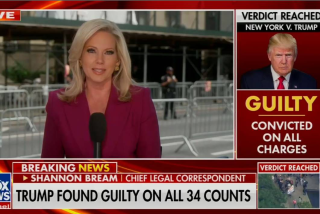‘I just feel so relieved.’ America reflects on the murder conviction of Derek Chauvin
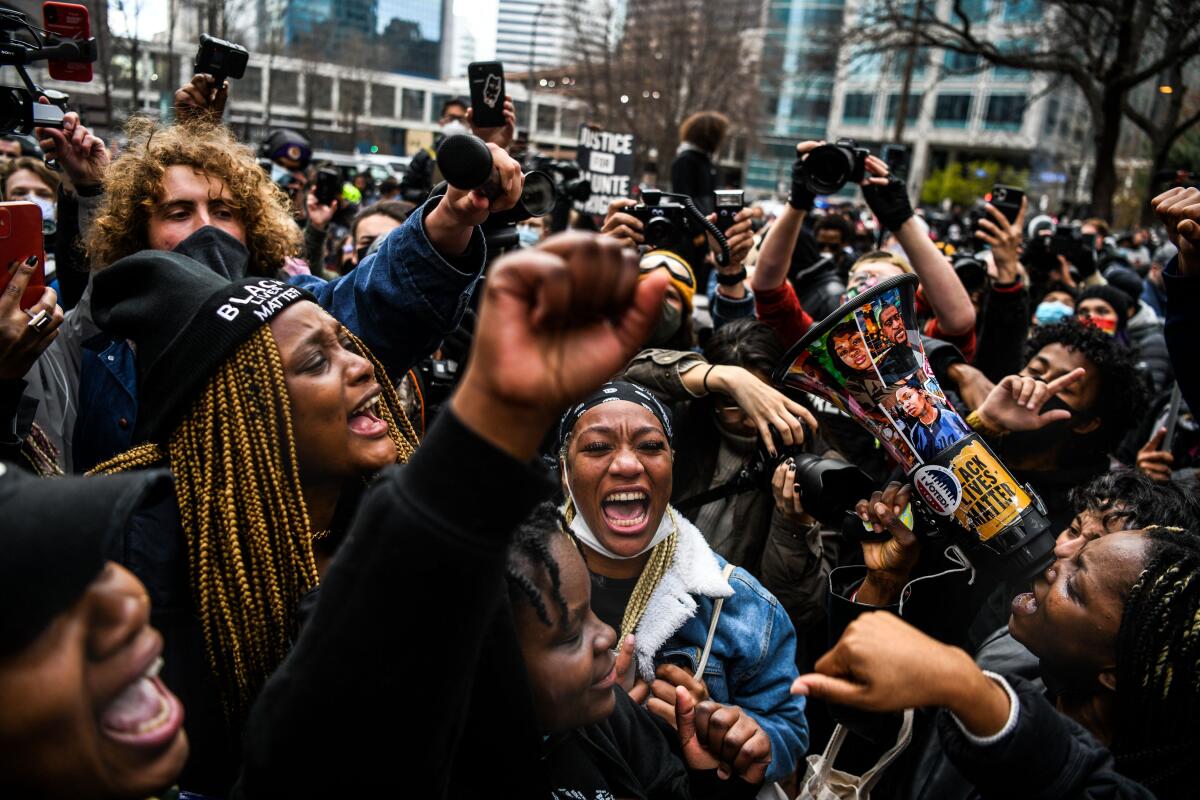
MINNEAPOLIS — They began gathering at 38th Street and Chicago Avenue here — an intersection now known as George Floyd Square — shortly after 3 p.m. One woman asked the crowd to pray as they waited.
Some watched livestreams of the court proceeding — located three miles away — on their phones. As the verdict was read, cheers filled the air.
People jumped and danced and thrust Black Lives Matter flags skyward. Two women sobbed in each other’s arms. Another woman walked around throwing dollar bills in the air.
Still, many described the second-degree murder conviction of former Police Officer Derek Chauvin as only the first step in achieving justice for Floyd, with three other former officers still awaiting trial in his killing.
“One down!” shouted Marcia Howard, 47, who has been at this intersection every day since Floyd died on it.
“Three to go!” the crowd responded.
At an out-of-business gas station, where demonstrators had been using the marquee to count the days of the trial, they took down “TRIAL DAY 31” and put up “JUSTICE SERVED?”
Reaction to verdict in death of George Floyd
The killing of Floyd under the knee of Chauvin in May spurred the largest protests against police brutality and racial injustice in U.S. history. The trial, broadcast live on cable TV, riveted the country for weeks.
When the verdict was finally read, the overwhelming emotion on display was relief. Across the country, people began to reflect on what it meant for a white officer to be convicted in the killing of a Black man.
The gatherings were largest in Minneapolis. In the suburb of Brooklyn Center, a dozen people who had gathered inside a salon — Handz-on Barber & Beauty — watched in silence as the verdict was read on three televisions, each tuned to a different station.
“Guilty, guilty, guilty,” barber Phillip Musa, 48, announced with a smile.
He said the verdict reassured him that “America wants to move forward, not backward,” and that perhaps police could start to build more trust with their communities.
Hanging in the barber shop was a photograph of his late brother, who was a police officer in Rhode Island.
Musa had boarded up his shop in anticipation of unrest. He said he would keep it that way at least a few more days, out of fear that Chauvin supporters from outside the Minneapolis area may show up and do damage. As of Tuesday night, none had come.
Ade Ologbonori, 36, a technology consultant, had worried the jury would convict Chauvin only on the lesser charges of manslaughter and third-degree murder.
“It’s perfect,” he said of the verdict — guilty on all three counts.
Nancy Seley, 36, who had brought her 11-year-old son in for a haircut, lauded the jury for a verdict she believed would send a strong message to police on use of force.
“They did it right,” she said. “There was no way for him to go free. Now all the other ones will see this and be on their guard.”
“I just feel so relieved,” Seley said.
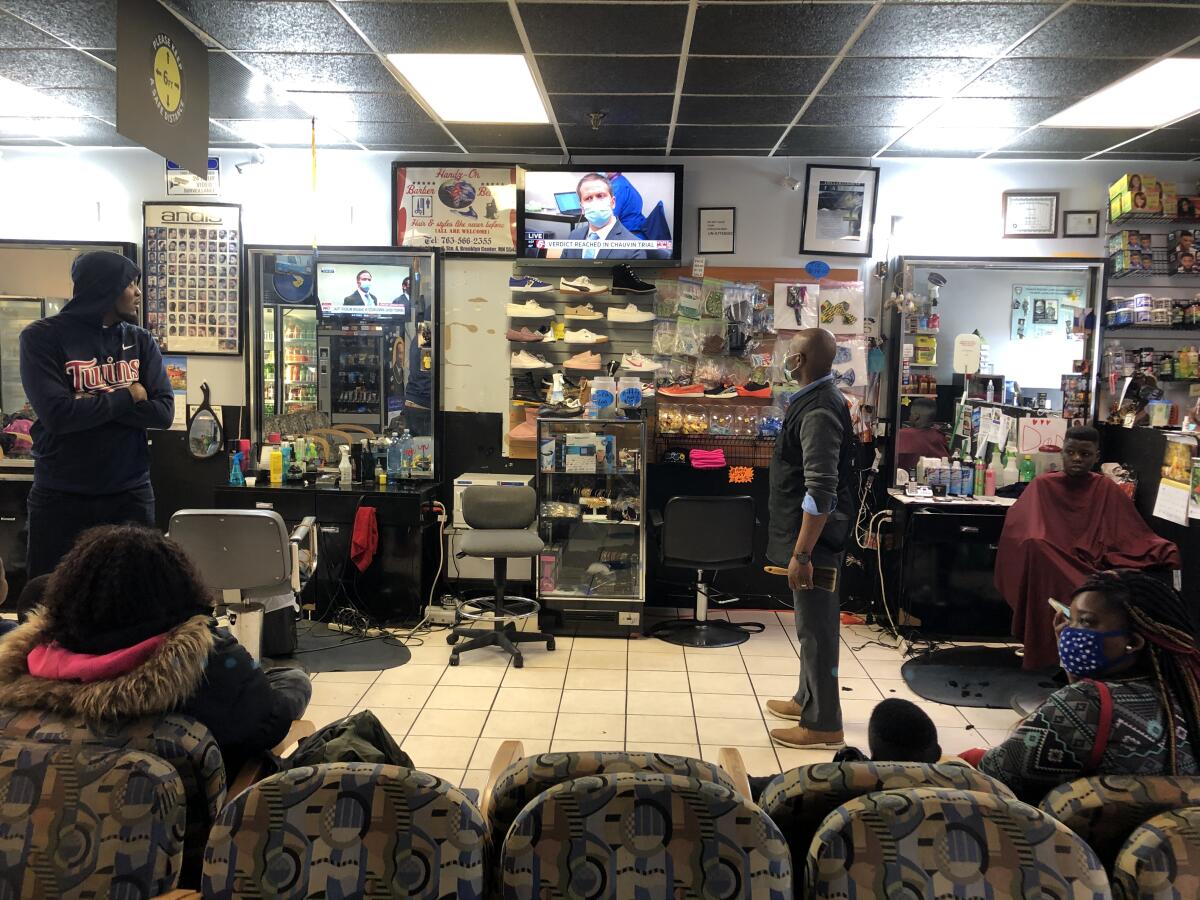
The nation had braced itself for this day. Helicopters flew over New York, with mayors and police in many major cities on edge over possible demonstrations if jurors reached a different outcome.
In Washington, law enforcement blocked off streets and access to parking in anticipation of large crowds.
Hannah Smith, 23, did not attend the largest Floyd protests in the summer. For that, she said, she still felt guilty.
But on Tuesday she came to the capital’s Black Lives Matter Plaza — established last year when the mayor ordered the three-word slogan that grew into a movement printed in big, bold letters on the street — to show her support.
For Smith, the verdict was not only about Chauvin or police brutality but also institutional racism against Black people — including her father, who died recently at age 63 from liver cancer and what she believes was “neglect from the healthcare system.”
Smith thought that her father, if alive, would have been there with her to observe what many were calling a historic moment.
In South Los Angeles, some 60 people gathered at Florence and Normandie, the intersection where the uprising that followed the police beating of Rodney King erupted in the ’90s.
Those officers were acquitted, precipitating riots. Tuesday afternoon, demonstrators wept with joy.
Waving large Black Lives Matter flags and carrying signs that read “Prosecute killer cops,” they encouraged passing cars to honk in support.
Drivers readily obliged. The mood was joyous, with hugs, music and dance.
But demonstrators made it clear that the verdict was not the end of their efforts.
Cliff Smith, 51, had been at the intersection since the first day of the jury selection for Chauvin’s trial. The verdict, he said, “is a vindication of the outpouring of grief” since Floyd’s murder.
In Atlanta, a few dozen activists gathered in front of the George Floyd mural on Edgewood Avenue holding signs that said “I can’t breathe” and “Black in Amerikkka equals death.”
They marched from Sweet Auburn, the neighborhood where the Rev. Martin Luther King Jr. once lived, to the heart of downtown, chanting, “Convict the cops” and “You can’t stop the revolution!”
“It’s not complete justice, because George is no longer with us, but it is a model to the rest of the country,” Gerald Griggs, a civil rights attorney, bellowed into a microphone.
Erica Thomas, a Democratic state representative, told the crowd that Tuesday was “just the beginning.”
“We will continue to march, we will continue to rally, until justice will be served for every single Black man and woman that has been killed in their sleep, that has been killed at their home, that has been killed while they are jogging,” she said. “We are not done yet.”
Back on the corner of 38th Street and Chicago Avenue in Minneapolis, demonstrators said it was a day on which to pause, cherish and reflect.
Amilcar Davis, 47, arrived after watching the news at home with his wife, 9-year-old daughter and 11-year-old son. He was nervous and felt sick to his stomach before the judge read the jury’s decisions. He couldn’t stay put at home after he heard the words: Guilty. Guilty. Guilty.
“I cried; I hugged my wife,” Davis said. “I was relieved.”
Still, he couldn’t help but note that it had been just over a week since a police officer in nearby Brooklyn Center had shot and killed Daunte Wright, a Black man. The officer said she mistakenly pulled her gun instead of her Taser during a traffic stop.
“It’s kind of one step to the next step,” Davis said. “It’s a day of justice and I appreciate that, but there’s years and years of unraveling injustice ahead of us.”
Times staff writers Hennessy-Fiske and Kaleem and special correspondent Ganguli reported from Brooklyn Center, Los Angeles and Minneapolis, respectively. Staff writers Erin Logan in Washington, Julia Barajas in Los Angeles and Jenny Jarvie in Atlanta contributed to this report.
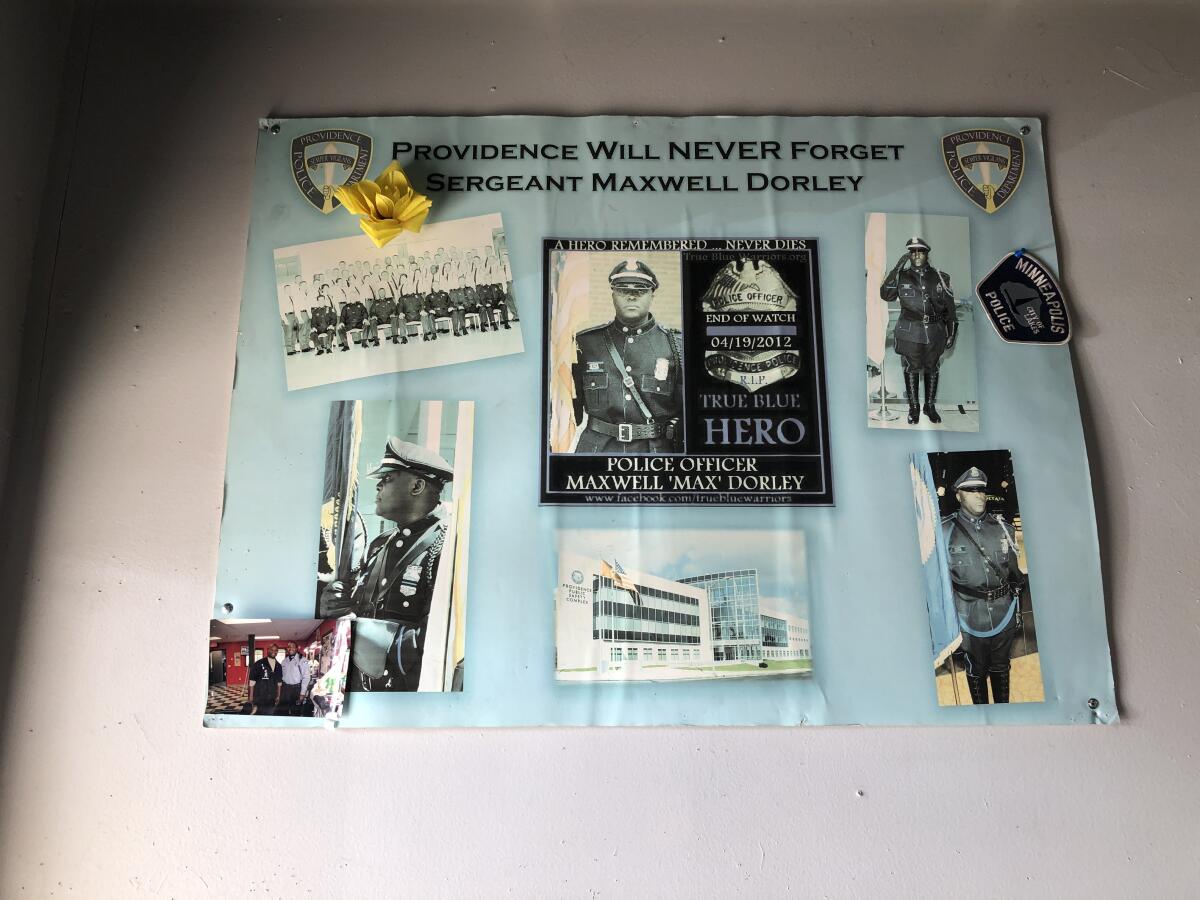
More to Read
Sign up for Essential California
The most important California stories and recommendations in your inbox every morning.
You may occasionally receive promotional content from the Los Angeles Times.
